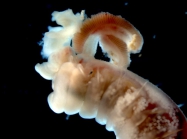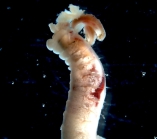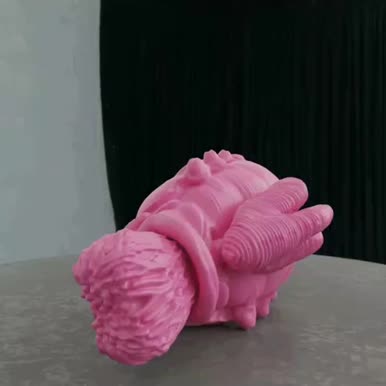RAS taxon details
Terebellides Sars, 1835
129717 (urn:lsid:marinespecies.org:taxname:129717)
accepted
Genus
Terebellides stroemii Sars, 1835 (type by monotypy)
Ampharetides Ehlers, 1913 · unaccepted (subjective synonym)
- Species Terebellides crux Schüller & Hutchings, 2013
- Species Terebellides kerguelensis McIntosh, 1885
- Species Terebellides longicaudatus Hessle, 1917
- Species Terebellides rigel Schüller & Hutchings, 2013
- Species Terebellides sirius Schüller & Hutchings, 2013
- Species Terebellides stroemii Sars, 1835
- Species Terebellides vanhoeffeni (Ehlers, 1913)
- Species Terebellides stroemi [auctt. misspelling] accepted as Terebellides stroemii Sars, 1835 (incorrect subsequent spelling)
marine, brackish, fresh, terrestrial
recent only
masculine
Sars, M. (1835). Beskrivelser og Iagttagelser over nogle moerkelige eller nye i Havet ved den Bergenske Kyst levende Dyr af Polypernes, Acalephernes, Radiaternes, Annelidernes og Molluskernes classer, med en kort Oversigt over de hidtil af Forfatteren sammesteds fundne Arter og deres Forekommen. Thorstein Hallagers Forlag hos Chr. Dahl, R.S., Bergen, xii + 81 pp. + 15 pls., available online at https://doi.org/10.5962/bhl.title.13017
page(s): 48 [details]
page(s): 48 [details]
Read, G.; Fauchald, K. (Ed.) (2025). World Polychaeta Database. Terebellides Sars, 1835. Accessed through: RAS (Eds.) (2025) Register of Antarctic Species at: https://ras.biodiversity.aq/aphia.php/aphia.php?p=taxdetails&id=129717 on 2025-09-12
RAS (Eds.) (2025). Register of Antarctic Species. Terebellides Sars, 1835. Accessed at: https://ras.biodiversity.aq/aphia.php?p=taxdetails&id=129717 on 2025-09-12
Date
action
by
original description
Sars, M. (1835). Beskrivelser og Iagttagelser over nogle moerkelige eller nye i Havet ved den Bergenske Kyst levende Dyr af Polypernes, Acalephernes, Radiaternes, Annelidernes og Molluskernes classer, med en kort Oversigt over de hidtil af Forfatteren sammesteds fundne Arter og deres Forekommen. Thorstein Hallagers Forlag hos Chr. Dahl, R.S., Bergen, xii + 81 pp. + 15 pls., available online at https://doi.org/10.5962/bhl.title.13017
page(s): 48 [details]
original description (of Ampharetides Ehlers, 1913) Ehlers, E. 1913. Die Polychaeten-Sammlungen der deutschen Südpolar- Expedition, 1901-1903. <i>Deutsche Südpolar-Expedition 1901-1903 im Auftrage des Reichsamtes des innern herausgegeben von Erich von Drygalski Leiter Expedition</i>, 13(4): 397-598, plates XXVI-XLVI., available online at https://www.biodiversitylibrary.org/page/2139283
page(s): 568 [details]
taxonomy source Garraffoni, A. R. S.; Lana, P. C.; Hutchings, P. (2005). A catalogue of the Trichobranchinae (Polychaeta: Terebellidae) of the world. <em>Zootaxa.</em> 1065, 1-27. [details]
taxonomy source Parapar, Julio; Martin, Daniel; Moreira, Juan. (2020). On the diversity of <em>Terebellides</em> (Annelida, Trichobranchidae) in West Africa, seven new species and the redescription of <em>T. africana</em> Augener, 1918 stat. prom. <em>Zootaxa.</em> 4771(1): 1-61., available online at https://www.mapress.com/j/zt/article/view/zootaxa.4771.1.1 [details] Available for editors
taxonomy source Lavesque, Nicolas; Hutchings, Pat. (2025). Exploration of the Iziko South African Museum's collection and description of new species of Spaghetti worms (Annelida, Terebelliformia), part one. <em>Zootaxa.</em> 5627(2): 343-359., available online at https://www.mapress.com/zt/article/view/zootaxa.5627.2.6 [details]
additional source Glasby, Christopher J.; Read, Geoffrey B.; Lee, Kenneth E.; Blakemore, R.J.; Fraser, P.M.; Pinder, A.M.; Erséus, C.; Moser, W.E.; Burreson, E.M.; Govedich, F.R.; Davies, R.W.; Dawson, E.W. (2009). Phylum Annelida: bristleworms, earthworms, leeches. <em>[Book chapter].</em> Chapt 17, pp. 312-358. in: Gordon, D.P. (Ed.) (2009). New Zealand inventory of biodiversity: 1. Kingdom Animalia: Radiata, Lophotrochozoa, Deuterostomia. Canterbury University Press, Christchurch. [details] Available for editors
additional source Fauchald, K. (1977). The polychaete worms, definitions and keys to the orders, families and genera. <em>Natural History Museum of Los Angeles County: Los Angeles, CA (USA), Science Series.</em> 28:1-188., available online at http://www.vliz.be/imisdocs/publications/123110.pdf [details]
additional source Bellan, G. (2001). Polychaeta, <i>in</i>: Costello, M.J. <i>et al.</i> (Ed.) (2001). European register of marine species: a check-list of the marine species in Europe and a bibliography of guides to their identification. <em>Collection Patrimoines Naturels.</em> 50: 214-231. (look up in IMIS) [details]
additional source Day, J. H. (1967). [Sedentaria] A monograph on the Polychaeta of Southern Africa. Part 2. Sedentaria. British Museum (Natural History), London. pp. 459–842., available online at http://www.biodiversitylibrary.org/bibliography/8596 [details]
additional source Hutchings, P.; Peart, R. (2000). A revision of the Australian Trichobranchidae (Polychaeta). <em>Invertebrate Systematics.</em> 14(2): 225-272., available online at http://dx.doi.org/10.1071/IT98005
page(s): 238-239; note: Emendation (re-diagnosis of genus) [details]
additional source Malmgren, Anders Johan. (1866? vol for 1865). Nordiska Hafs-Annulater. [part three of three]. <em>Öfversigt af Königlich Vetenskapsakademiens förhandlingar, Stockholm.</em> 22(5): 355-410, plates XVIII-XXIX., available online at https://biodiversitylibrary.org/page/32339631
page(s): 396 [details]
additional source Nygren, Arne; Parapar, Julio; Pons, Joan; Meißner, Karin; Bakken, Torkild; Kongsrud, Jon Anders; Oug, Eivind; Gaeva, Daria; Sikorski, Andrey; Johansen, Robert André; Hutchings, Pat Ann; Lavesque, Nicolas; Capa, Maria. (2018). A mega-cryptic species complex hidden among one of the most common annelids in the North East Atlantic. <em>PLOS ONE.</em> 13(6): e0198356., available online at http://journals.plos.org/plosone/article?id=10.1371/journal.pone.0198356
note: indications of 18 additional species (not described) to the seven already described from NE Atlantic [details]
identification resource Garraffoni, André R.S.; Lana, Paulo C. (2003). Species of <i>Terebellides</i> (Polychaeta, Terebellidae, Trichobranchinae) from the Brazilian coast. <em>Iheringia. Série Zoologia.</em> 93(4): 355-363., available online at https://doi.org/10.1590/S0073-47212003000400002 [details] Available for editors
identification resource Parapar, J.; Mikac, B.; Fiege, D. (2013). Diversity of the genus <em>Terebellides</em> (Polychaeta: Trichobranchidae) in the Adriatic Sea with the description of a new species. <em>Zootaxa.</em> 3691(3): 333., available online at https://doi.org/10.11646/zootaxa.3691.3.3 [details] Available for editors
identification resource Parapar, J., J. Moreira & M. O'Reilly. (2016). A new species of Terebellides (Polychaeta: Trichobranchidae) from Scottish waters with an insight into branchial morphology. <em>Marine Biodiversity.</em> 46(1):211-225., available online at https://doi.org/10.1007/s12526-015-0353-5
page(s): 223; note: key to Terebellides species of the North East Atlantic and Mediterranean Sea [details]
identification resource Parapar, Julio; Moreira, Juan; Martin, Daniel. (2016). On the diversity of the SE Indo-Pacific species of <i>Terebellides</i> (Annelida; Trichobranchidae), with the description of a new species. <em>PeerJ.</em> 4: e2313., available online at http://dx.doi.org/10.7717/peerj.2313
page(s): 14/23; note: key to all Terebellides species described in SE Indo-Pacific waters [details]
identification resource Schüller, Myriam; Hutchings, Pat A. (2013). New species of <em>Terebellides</em> (Polychaeta: Trichobranchidae) from the deep Southern Ocean, with a key to all described species. <em>Zootaxa.</em> 3619(1): 1-45., available online at https://www.biotaxa.org/Zootaxa/article/view/zootaxa.3619.1.1
page(s): 41; note: key to all adequately described species then named [details] Available for editors
identification resource Parapar, Julio; Capa, María; Nygren, Arne; Moreira, Juan. (2020). To name but a few: descriptions of five new species of <em>Terebellides</em> (Annelida, Trichobranchidae) from the North East Atlantic. <em>ZooKeys.</em> 992: 1-58., available online at https://zookeys.pensoft.net/article/55977
page(s): 43; note: Key to European species of Terebellides [details] Available for editors
identification resource Lavesque, Nicolas; Nogueira, João M. M.; Daffe, Guillemine.; Hutchings, Pat. (2024). Five new species of Terebellides (Annelida, Polychaeta, Trichobranchidae) from Papua New Guinea (Bismarck and Solomon seas). <em>Frontiers in Ecology and Evolution.</em> 12: 1349362: 1-22., available online at https://www.frontiersin.org/articles/10.3389/fevo.2024.1349362/full
note: Key to Terebellides species from the Central Indo-Pacific region [details]
page(s): 48 [details]
original description (of Ampharetides Ehlers, 1913) Ehlers, E. 1913. Die Polychaeten-Sammlungen der deutschen Südpolar- Expedition, 1901-1903. <i>Deutsche Südpolar-Expedition 1901-1903 im Auftrage des Reichsamtes des innern herausgegeben von Erich von Drygalski Leiter Expedition</i>, 13(4): 397-598, plates XXVI-XLVI., available online at https://www.biodiversitylibrary.org/page/2139283
page(s): 568 [details]
taxonomy source Garraffoni, A. R. S.; Lana, P. C.; Hutchings, P. (2005). A catalogue of the Trichobranchinae (Polychaeta: Terebellidae) of the world. <em>Zootaxa.</em> 1065, 1-27. [details]
taxonomy source Parapar, Julio; Martin, Daniel; Moreira, Juan. (2020). On the diversity of <em>Terebellides</em> (Annelida, Trichobranchidae) in West Africa, seven new species and the redescription of <em>T. africana</em> Augener, 1918 stat. prom. <em>Zootaxa.</em> 4771(1): 1-61., available online at https://www.mapress.com/j/zt/article/view/zootaxa.4771.1.1 [details] Available for editors
taxonomy source Lavesque, Nicolas; Hutchings, Pat. (2025). Exploration of the Iziko South African Museum's collection and description of new species of Spaghetti worms (Annelida, Terebelliformia), part one. <em>Zootaxa.</em> 5627(2): 343-359., available online at https://www.mapress.com/zt/article/view/zootaxa.5627.2.6 [details]
additional source Glasby, Christopher J.; Read, Geoffrey B.; Lee, Kenneth E.; Blakemore, R.J.; Fraser, P.M.; Pinder, A.M.; Erséus, C.; Moser, W.E.; Burreson, E.M.; Govedich, F.R.; Davies, R.W.; Dawson, E.W. (2009). Phylum Annelida: bristleworms, earthworms, leeches. <em>[Book chapter].</em> Chapt 17, pp. 312-358. in: Gordon, D.P. (Ed.) (2009). New Zealand inventory of biodiversity: 1. Kingdom Animalia: Radiata, Lophotrochozoa, Deuterostomia. Canterbury University Press, Christchurch. [details] Available for editors
additional source Fauchald, K. (1977). The polychaete worms, definitions and keys to the orders, families and genera. <em>Natural History Museum of Los Angeles County: Los Angeles, CA (USA), Science Series.</em> 28:1-188., available online at http://www.vliz.be/imisdocs/publications/123110.pdf [details]
additional source Bellan, G. (2001). Polychaeta, <i>in</i>: Costello, M.J. <i>et al.</i> (Ed.) (2001). European register of marine species: a check-list of the marine species in Europe and a bibliography of guides to their identification. <em>Collection Patrimoines Naturels.</em> 50: 214-231. (look up in IMIS) [details]
additional source Day, J. H. (1967). [Sedentaria] A monograph on the Polychaeta of Southern Africa. Part 2. Sedentaria. British Museum (Natural History), London. pp. 459–842., available online at http://www.biodiversitylibrary.org/bibliography/8596 [details]
additional source Hutchings, P.; Peart, R. (2000). A revision of the Australian Trichobranchidae (Polychaeta). <em>Invertebrate Systematics.</em> 14(2): 225-272., available online at http://dx.doi.org/10.1071/IT98005
page(s): 238-239; note: Emendation (re-diagnosis of genus) [details]
additional source Malmgren, Anders Johan. (1866? vol for 1865). Nordiska Hafs-Annulater. [part three of three]. <em>Öfversigt af Königlich Vetenskapsakademiens förhandlingar, Stockholm.</em> 22(5): 355-410, plates XVIII-XXIX., available online at https://biodiversitylibrary.org/page/32339631
page(s): 396 [details]
additional source Nygren, Arne; Parapar, Julio; Pons, Joan; Meißner, Karin; Bakken, Torkild; Kongsrud, Jon Anders; Oug, Eivind; Gaeva, Daria; Sikorski, Andrey; Johansen, Robert André; Hutchings, Pat Ann; Lavesque, Nicolas; Capa, Maria. (2018). A mega-cryptic species complex hidden among one of the most common annelids in the North East Atlantic. <em>PLOS ONE.</em> 13(6): e0198356., available online at http://journals.plos.org/plosone/article?id=10.1371/journal.pone.0198356
note: indications of 18 additional species (not described) to the seven already described from NE Atlantic [details]
identification resource Garraffoni, André R.S.; Lana, Paulo C. (2003). Species of <i>Terebellides</i> (Polychaeta, Terebellidae, Trichobranchinae) from the Brazilian coast. <em>Iheringia. Série Zoologia.</em> 93(4): 355-363., available online at https://doi.org/10.1590/S0073-47212003000400002 [details] Available for editors
identification resource Parapar, J.; Mikac, B.; Fiege, D. (2013). Diversity of the genus <em>Terebellides</em> (Polychaeta: Trichobranchidae) in the Adriatic Sea with the description of a new species. <em>Zootaxa.</em> 3691(3): 333., available online at https://doi.org/10.11646/zootaxa.3691.3.3 [details] Available for editors
identification resource Parapar, J., J. Moreira & M. O'Reilly. (2016). A new species of Terebellides (Polychaeta: Trichobranchidae) from Scottish waters with an insight into branchial morphology. <em>Marine Biodiversity.</em> 46(1):211-225., available online at https://doi.org/10.1007/s12526-015-0353-5
page(s): 223; note: key to Terebellides species of the North East Atlantic and Mediterranean Sea [details]
identification resource Parapar, Julio; Moreira, Juan; Martin, Daniel. (2016). On the diversity of the SE Indo-Pacific species of <i>Terebellides</i> (Annelida; Trichobranchidae), with the description of a new species. <em>PeerJ.</em> 4: e2313., available online at http://dx.doi.org/10.7717/peerj.2313
page(s): 14/23; note: key to all Terebellides species described in SE Indo-Pacific waters [details]
identification resource Schüller, Myriam; Hutchings, Pat A. (2013). New species of <em>Terebellides</em> (Polychaeta: Trichobranchidae) from the deep Southern Ocean, with a key to all described species. <em>Zootaxa.</em> 3619(1): 1-45., available online at https://www.biotaxa.org/Zootaxa/article/view/zootaxa.3619.1.1
page(s): 41; note: key to all adequately described species then named [details] Available for editors
identification resource Parapar, Julio; Capa, María; Nygren, Arne; Moreira, Juan. (2020). To name but a few: descriptions of five new species of <em>Terebellides</em> (Annelida, Trichobranchidae) from the North East Atlantic. <em>ZooKeys.</em> 992: 1-58., available online at https://zookeys.pensoft.net/article/55977
page(s): 43; note: Key to European species of Terebellides [details] Available for editors
identification resource Lavesque, Nicolas; Nogueira, João M. M.; Daffe, Guillemine.; Hutchings, Pat. (2024). Five new species of Terebellides (Annelida, Polychaeta, Trichobranchidae) from Papua New Guinea (Bismarck and Solomon seas). <em>Frontiers in Ecology and Evolution.</em> 12: 1349362: 1-22., available online at https://www.frontiersin.org/articles/10.3389/fevo.2024.1349362/full
note: Key to Terebellides species from the Central Indo-Pacific region [details]
 Present
Present  Inaccurate
Inaccurate  Introduced: alien
Introduced: alien  Containing type locality
Containing type locality



